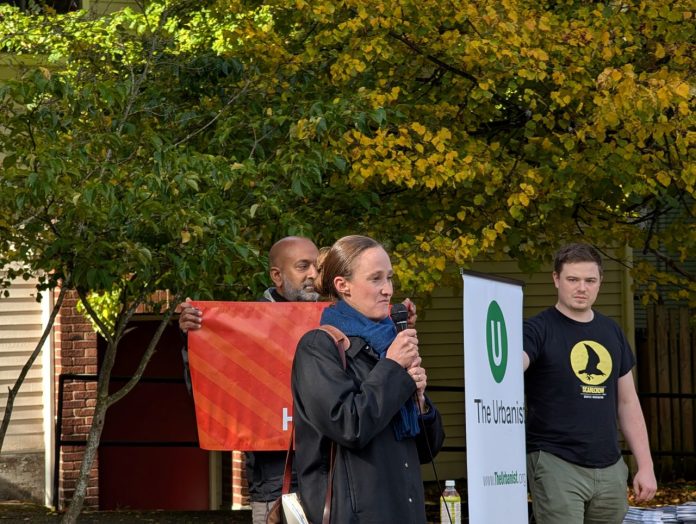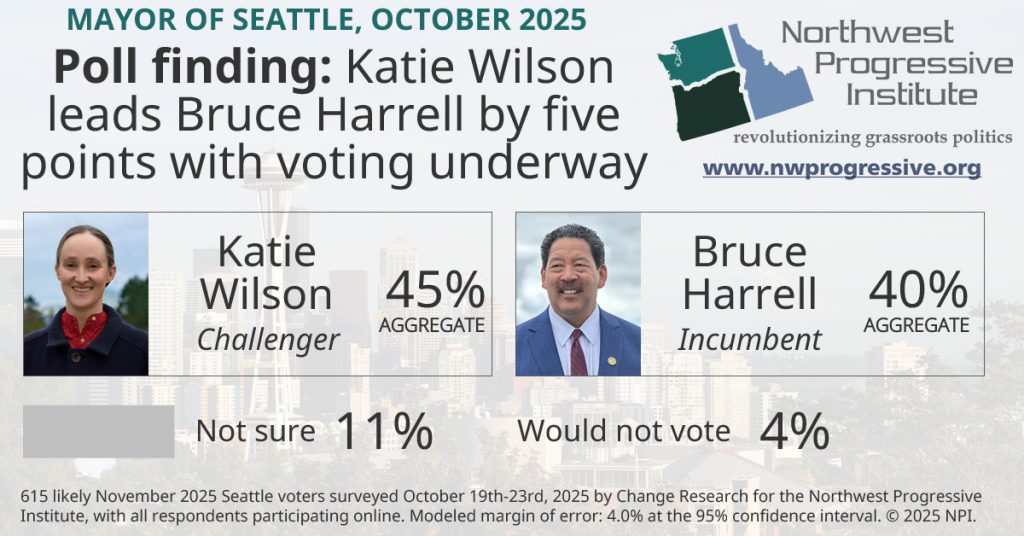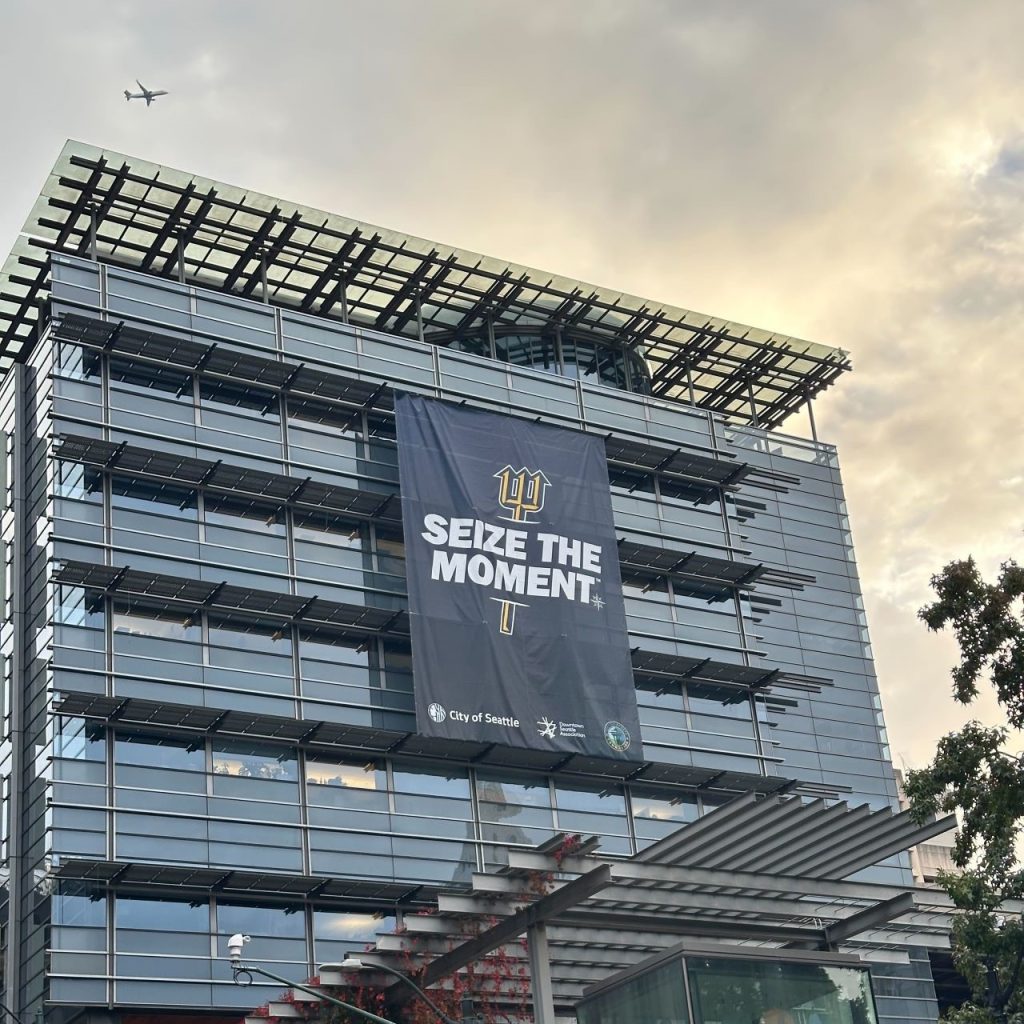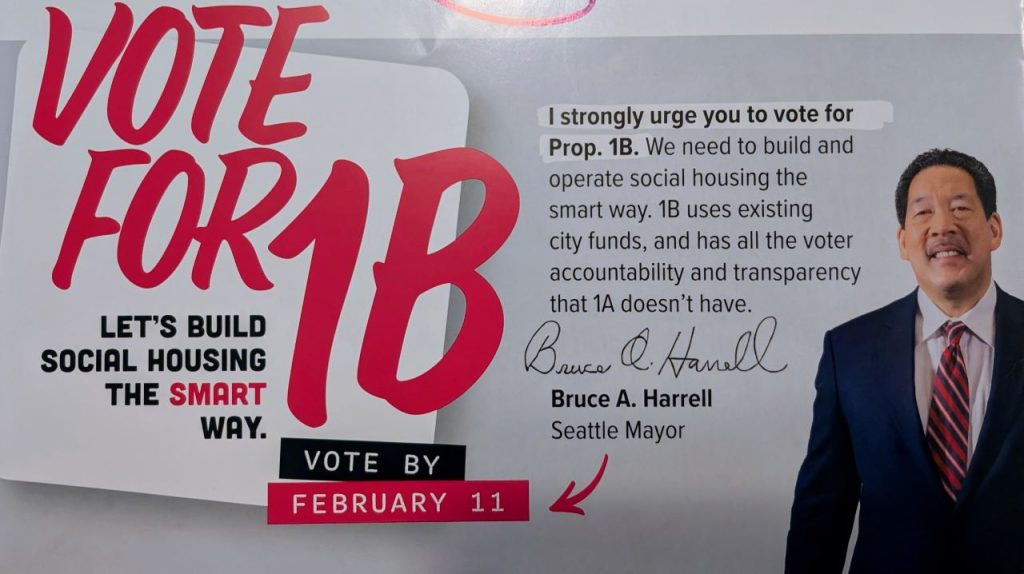
Progressive challenger Katie Wilson continues to have the edge in Seattle’s highly competitive mayoral race, despite a large fundraising advantage for corporate-backed incumbent Bruce Harrell. Two polls released this week indicate that Wilson still holds a lead, after winning the primary election by nearly 10 points.
A poll of likely voters commissioned by Northwest Progressive Institute (NPI) found that Wilson led Harrell by five points. Moreover, 55% of respondents said they did not want Harrell to win a second term. That’s a tough spot to be in as an incumbent.

Change Research conducted the poll from October 19 to 23, modeling a 4% margin of error.
A DHM Research poll commissioned by The Stranger found Wilson leading by a similar amount. The pollster found a 12-point lead in the general population, but a four-point lead among its “likely voter” subset, technically within the statistical margin of error. Reaching 600 Seattle voters — 400 of them “likely voters” — the poll went to field October 6 through 13.

The Stranger poll found even stronger leads for Seattle’s other progressive candidates. Dionne Foster led Council President Sara Nelson by nine points in the poll; progressive City Councilmember Alexis Mercedes Rinck has an enormous 34-point lead over Republican challenger Rachael Savage, and Erika Evans led Republican Seattle City Attorney Ann Davison by 11 points.
NPI has not yet released its results in the Council races, but is expected to do so in coming days.
The Urbanist elections committee (disclosure: I am on that 14-member committee) endorsed Wilson, Rinck, Foster, and Evans, as did The Stranger.
Harrell empire strikes back
With polls indicating a single-digit lead for Wilson, the glass-half-empty take is that the race has tightened, with Harrell coming on strong after a lackadaisical performance in the primary. Harrell has gone on the attack and ramped up campaign efforts, rolling out frequent headline-chasing initiatives and press events.
Harrell has also ramped up fundraising and has a well-funded political action committee (PAC) that has raised more than $1.6 million on his behalf, more than four times what a pro-Wilson PAC has raised. In what appears to be a violation of state campaign finance rules, Harrell spoke at a fundraiser hosted by his PAC in September, which his Senior Deputy Mayor Tim Burgess runs. Officially, PACs are not supposed to coordinate with the candidates or campaigns they are supporting, and state law would classify fundraising assistance from the candidate as an in-kind contribution.
Each of the candidates has also raised about $1 million, largely though Seattle’s democracy voucher program, which publicly finances elections, but caps campaign spending. PACs do not face these spending limits. The advantage in outside money gives the campaign behind Harrell an extra $1.2 million to spend, based on what’s reported so far.
The Harrell side has used that money to run a plethora of ads, including high-profile TV ads that aired during highly-watched Mariners playoff baseball games. Those ads sought to paint Wilson as “unprepared” and having “almost no management experience.”
In another Mariners connection, several of the pro-Harrell PAC’s top donors are Mariners executives or linked to them. Mariners CEO John Stanton and his wife Theresa Gillespie have contributed $50,000 each, and Mariners general partner Christopher Ross Larson has also chipped in $50,000. None of the three live in Seattle — the Stanton family resides in the wealthy enclave of Medina.
The love affair goes in the other direction, too. Mayor Bruce Harrell hoisted a Mariners flag in front of Seattle City Hall earlier this month. Workers adds a giant, three-story “Seize The Moment” banner advertisement on the side of the building, featuring the Mariners trident logo. While the Mariners came out one swing short of seizing the moment, Harrell is hoping his Mariners ties can still buoy him to victory.

Other than trying to siphon energy an exhilarating Mariners postseason run, Harrell has hit Wilson for being a college dropout — she left Oxford University in England six weeks short of graduating. He’s also sought to paint her as a “Defund” candidate for her ties to the Black Lives Matter movement that raised calls to shift half of police spending to civilian safety programs in 2020 and 2021.
Wilson has disavowed that defund call, and she has criticized Harrell’s failure to improve accountability and outcomes at the Seattle Police Department — despite big jumps in officer pay and department expenditures.
Blowback from Harrell attacks
Harrell’s attacks on Wilson have come at a cost, according to poll analysis by NPI executive director Andrew Villeneuve, who pointed to the mayor’s increasingly negative favorability rating.
“The attacks on Wilson instead appear to be backfiring completely and are further eroding Mayor Harrell’s standing with the Seattle electorate,” Villeneuve wrote. “We can see this in the latest favorability numbers for each candidate. Wilson enjoys a positive spread similar to what she had in the summer, when fewer voters had an opinion of her, while Harrell’s favorability rating has dropped further into negative territory. Harrell had a nine point negative spread in July; this month, he has a sixteen point negative spread.”
The Harrell campaign appears to be emptying its cache of opposition research. Earlier this week, his campaign tried to hit Wilson for accepting money from her parents to help pay childcare expenses for her daughter. Rather than turning off voters, some Seattle parents argued this only underscored that Wilson was in touch with the struggles they face as parents in a city with sky-high costs for childcare and family-sized housing — and Harrell was not. (Harrell is a millionaire who lives in a four-million-dollar home along the shores of Lake Washington and recently opposed a grassroots initiative to fund family-sized social housing.)

In other words, the glass-half-full take is Harrell is flailing and desperately trying to stir up the race, but the fundamental dynamic remains the same as in the primary election. In fact, his aggressive attacks on Wilson appears to have exacerbated Harrell’s negative perception among Seattle voters.
But, as the saying goes, the only poll that truly matters is the election. Who turns out will swing the outcome. Don’t forget to vote by November 4.
Doug Trumm is publisher of The Urbanist. An Urbanist writer since 2015, he dreams of pedestrian streets, bus lanes, and a mass-timber building spree to end our housing crisis. He graduated from the Evans School of Public Policy and Governance at the University of Washington in 2019. He lives in Seattle's Fremont neighborhood and loves to explore the city by foot and by bike.

